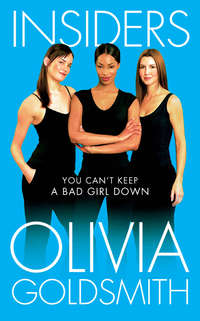
Полная версия
Fashionably Late
‘Hey, Karen. Lookin’ good,’ Bobby Pillar said.
‘You ought to know. You own a network,’ Karen smiled. ‘But not this one. What are you doin’ here?’
‘A little of this, a little of that. And maybe watching you. I have a feeling you’d just be a natural on television.’
‘A natural disaster,’ Karen croaked. ‘I’m afraid I’m going to wet my pants.’
‘So what if you do? That they’ll edit out,’ he laughed. ‘Why don’t we do lunch some time?’ he asked.
‘Sure,’ she said, but was relieved when her minder cleared his throat and gave her a not-so-gentle little push toward the green room. A technician came to her with a tiny mike on a thin black cord. ‘Could you snake this up your sweater?’ he asked. She nodded and pulled the end out of the turtleneck. ‘Now could you take this end and clip it somewhere?’ he asked. The lower end of the cord had a black box about the size of a Walkman attached to it. Karen wondered if it would spoil the line of her sweater.
The sound man, meanwhile, was fiddling with the mike. ‘You know,’ he said, ‘this sweater collar is really going to make a problem for us. I think it will rub against the microphone. Could you put on something else? I could call wardrobe.’
She looked at him as if he was crazy. She had thought for weeks about what she was going to wear and had decided on this tunic and leggings as both comfortable and becoming. Now, at the last minute, he wanted her to put on something else? Something not designed by her? ‘Get Mercedes,’ she told the guy.
She sat down on the Herculon-covered sofa that was the major piece in the green room. For some reason, green rooms, the holding pen for the talk show cattle, were never green. This one was beige, and the walls were smudged. Probably with the tears of other guests who went out there and ruined their lives, Karen thought. Then Mercedes walked in. She’d already been told the problem.
‘Defina’s on her way over,’ Mercedes told her in a don’t-you-dare-panic voice. ‘She’s bringing a few pieces so you can choose whatever you want.’
It took twenty minutes, but Karen saw Defina’s face behind the rack of stuff being pushed into the room and took the first deep breath she had taken – for what seemed like hours. ‘Starting another fire?’ Defina asked. ‘Never fear.’ She plucked a taupe jacket off the wheeled rack. ‘The producer says this will only be shot from the waist up. You can leave on the leggings, so how about this? Or, if you want to go real casual, how about this boatneck sweater?’
Karen turned to Mercedes. ‘Which would work better?’ she asked.
‘You won’t see the mike if you wear the jacket but I like the casualness of the sweater better.’
‘Me, too,’ Defina agreed.
Karen nodded. She peeled off the turtleneck and reached out for the sweater. Defina shook her head. ‘You need another quart of makeup, pale face,’ she said, pointing to the line that ended halfway down Karen’s neck. This time the redhead came to Karen. So did the producer and the director. Apparently they were behind schedule.
‘Elle is waiting,’ Paul Swift whined, and the redhead slapped the makeup on faster. At last, Karen was ready for her clothes. Carefully, Defina and Mercedes lowered the sweater over her painted shoulders. Then they snaked up the mike and this time it was clipped easily. It felt pretty comfortable, but Karen felt a little bulge just below the elbow seam. She reached up and closed her hand over something. It was a sachet or something like it, pinned on with a gold safety pin.
‘Leave it,’ Defina told her. ‘Madame Renault sent it. It’ll help.’
And, for once, Karen felt she needed all the help she could get. What the hell, she told herself. Was the magic of Madame Renault any more superstitious than her own magic photographs?
‘So what do you think clothes should do for a woman?’ Elle was asking.
‘They should complement her, and they should be comfortable. And they should protect her,’ Karen said. She’d gotten used to the lights and felt as if she had managed to be both entertaining and sincere. Elle Halle moved in a little closer, crouching forward on her elegant white wing chair.
‘Who do you feel deserves success in the fashion world?’
‘Well, I think it comes to those who best reconcile a woman’s external reality with her internal dream.’ Karen wondered if she sounded pretentious. It was what she believed.
‘So what do you think about the clothes by Christian Lacroix? Or some of the other designers of excess?’
Lacroix was the first new French couturier to set up shop in twenty years. After a couple of seasons of huge publicity, he’d sunk in acclaim. The word was his backers had lost millions. This was one of the pitfalls that Karen had been afraid of. She knew Elle was hoping she would rip into some of the other designers. If Karen took the bait, she’d create a lot of bad feeling. If she didn’t, she’d look like a goodie-goodie, and maybe commit the greatest television sin of all: she’d bore her audience.
Now she looked over at Elle. The woman was perfectly groomed. She was wearing an Ungaro. Her hair was a smooth helmet of dozens of blonde-colored strands. Not one was out of place, but Karen had noticed there were two people who ministered to the helmet every time there was even the slightest pause in taping. Karen also couldn’t help but notice that no one had fixed her own hair since she had sat down. She wondered if her scalp was sweating from the lights, and if her hair was lank.
‘I think diversity is wonderful,’ Karen said. ‘I think men and women should have all the choices they want. But for me, I don’t want to dress in a costume, no matter how lovely.’ That should take care of Lacroix et al.
‘So, are you calling Lacroix a costume-maker?’ Elle asked brightly. She hadn’t let Karen slip away gracefully.
No, Karen thought. I’m calling you a bitch. But she kept her face friendly. In fact, she laughed. ‘Wait a minute,’ she said. ‘You’re the one who said that.’ Where had that come from? She’d turned things around neatly. Karen felt the little sachet bump against her elbow. Thank you, Madame Renault.
‘There’s a lot of stealing that goes on in your business, isn’t there? For instance, a lot of people say that when you look at Norris Cleveland’s designs this year, you’re looking at Karen Kahn’s from last year. How do you feel about that?’
Karen laughed uncomfortably. ‘You know what people also say? That there’s nothing new under the sun. We all get our inspiration from all over. If I’ve inspired anything I feel flattered if it’s well done and depressed if it isn’t. Norrell was a great designer, and he said he just reinterpreted Chanel for his whole career.’
Elle dropped the line of questioning, but immediately screwed that look of concern onto her face that the audience knew meant a real killer was coming. Karen braced herself.
‘Women like you because you represent success in business. You have done so well in a man’s world. So how do you think your husband feels, being second-in-command?’ Elle asked. ‘Has it made problems in your marriage? It isn’t easy for any man to take a back seat to his wife, and your husband is, if I may say, a very dynamic guy.’
Jesus Christ! What had Jeffrey said in his interview?
‘Jeffrey doesn’t take a back seat to me,’ Karen said. ‘He’s in charge of all the business decisions. He’s always been the driving force behind me.’
‘So, you agree that he’s behind, rather than leading the way. That you’re the creative one.’
‘No. That’s not what I said.’ Exasperated, Karen looked away from the camera, away from Elle. ‘We don’t have a competitive relationship,’ she said. ‘We complement each other. I structure the clothes. He structures our company. We both create.’
‘But you got the Oakley Award,’ Elle said sweetly.
‘Yes, and Jeffrey was very proud.’
‘That’s very modern,’ Elle said. ‘Does he mind that you have controlling interest in the company? You do own the vast majority of the stock?’
Holy shit! Where did that come from? Surely Jeffrey hadn’t mentioned that. And the company was privately held, so how had Elle’s researchers dug that up? If Karen denied it, she’d be lying, and if she confirmed it, wouldn’t she be humiliating Jeffrey? Karen felt the seconds stretch out. She had to say something. ‘I don’t have a vast majority,’ she said. ‘Both of us are happy with the way our business has developed,’ she added. ‘Don’t you think we ought to be?’
Elle didn’t answer. ‘Would you ever sell it?’ she asked.
Karen took a deep breath. ‘I can’t see it happening,’ she said. ‘But I suppose that anything is possible.’
Karen felt sweat beading on her upper lip. She wished they could take a break, that she could get a glass of water and ask Defina how she was doing. She wondered if Jeffrey was there, behind the lights or in the green room. Was he groaning over her responses? Was she allowed to interrupt so she could regroup?
It wasn’t necessary. Because just then Elle reached over and touched Karen’s hand. ‘Thank you so much for coming here today,’ Elle said. As Karen opened her mouth to say, ‘You’re welcome,’ Elle had already tossed her perfect head and turned to look past the lights to the director. ‘Do we need any reaction shots?’ she asked the darkness, and Karen sat and waited for the answer.
It was over at last, and Karen expected to feel a swell of relief. She’d gotten through it, come off pretty well, and hadn’t been confronted with anything scandalous or shameful. Elle hadn’t paraded her real mother in front of her.
It was strange, then, that she felt disappointed.
CHAPTER EIGHT
Everyone Has One
Karen didn’t like the country.
When she was going on seven years old her mother and father thought it best to get her out of Brooklyn for the summer. They rented a bungalow in Freehold, New Jersey. Belle was heavily pregnant with Lisa and the city heat was too much for her. But so was the Jersey heat, and because of it Belle spent her days enervated, lying on a webbed plastic and aluminum folding chaise. Karen had spent their first few hot summer days alone, wandering the country lanes. When she found a bank along the roadside where wild strawberries grew, she had picked and eaten dozens of them without noticing they grew amidst poison ivy. Who knew from poison ivy in Brooklyn? She’d come down with a terrible case – all over her hands, her face, and the inside of her mouth. It had been torture.
She spent two weeks in bed while Belle slapped calamine lotion on her and yelled every time Karen scratched herself. ‘You’ll get scars!’ Belle warned. As it happened, Karen’s only scars from the experience were emotional: she still saw the country as truly dangerous. City danger was visible and largely avoidable – cross the street to prevent problems with an approaching gang of pubescent boys, avoid both cats and men nicknamed ‘Slasher,’ and don’t get into taxis driven by Asians. But in the country, danger lurked in even the most innocent-looking flowers. The woods were filled with men with guns, rabid animals, dangerous ankle-breaking sinkholes, and worse. People could disappear into the woods and never be heard from again.
That was one of the reasons why Karen was unenthusiastic when Jeffrey had proposed building the house in the country. Of course, Westport, Connecticut, was hardly the country – it was more like an extension of New York’s Upper East Side with lawns. Karen didn’t need it. With all the trouble she had with her work schedule and in keeping their New York household organized, she felt that another domestic responsibility was not at the top of her hit parade. But when Jeffrey had been insistent, she’d agreed to make a Real Deal: they kept the New York apartment instead of upgrading to a better address, but they built the house in Westport.
She had to admit that it was actually a beautiful house. And Jeffrey had done it all. Valentino had his interiors done by Peter Marino. Versace used the Italian Mongiardino. Yves Saint Laurent had Jacques Grange and Oscar de la Renta used three: Fourcade, Despont, and that American doyenne Sister Parrish. So you had to give Jeffrey credit. Artificially weathered to a dove-soft gray, it was one of those modern shingled jobs that had all the charm of an old house with all the conveniences of a new one. It was Jeffrey’s masterpiece. It sat well back from the road, shaded by two enormous maple trees, and the back had six hundred feet of river frontage.
Karen had to admit that the spacious white rooms with the oversized furniture (all with white linen slipcovers) were spectacular, but she didn’t revel in the place the way Jeffrey did. He had suggested that Elle Halle’s film crew come up and tape them walking there among the trees. That had been a few weeks ago, and Karen had ruined a pair of boots schlepping along the muddy river edge. If God had meant people to walk in the country, he would have made sidewalks. But what else but walking was there to do in the country? No movies, no shopping, no taxis, and you had to drive for miles to get anywhere. Somehow, sitting on the fieldstone terrace and slapping at mosquitoes wasn’t Karen’s idea of heaven. And who needed five bedrooms and four baths? Especially now, when they’d never be filled with children.
Ernesta refused to make the trip out to Westport, so on the weekends when Karen was there she depended on help from a local housekeeper. But Mrs Frampton was almost more trouble than she was worth. Karen had to explain everything to her so often and in such detail she simply found it easier to do most of it herself. This morning, a sunny Sunday, she was trying to get the woman to help her organize the brunch.
Brunch was the only meal that Karen trusted herself with when she was entertaining people. She’d never have people over for dinner without a caterer or Ernesta’s help. But brunch was relatively easy – a few bagels, some fruits and cheeses from Stew Leonard’s, a little smoked fish brought up from the city, and she was home free. Even Jeffrey, a stickler for those kinds of details, admired her brunches.
Today, however, it wasn’t coming together, but then, nothing had this weekend. Jeffrey had been insistent on making her go over all the stats again and again with Robert-the-lawyer laboriously reviewing the endless financials for the NormCo meeting. It wasn’t until Saturday night, when they were expected for dinner at some friends in Weston, that she had felt even close to human. She’d put on the new brown faille tunic she was experimenting with and a pair of darker brown knit linen leggings. Very medieval. She was always conscious of what she wore on evenings out. People expected her to dress well, and even though she’d like to live in sweat pants, she had to oblige. So she strove to come up with weekend wear that looked great but felt as comfy as sweats. And she did look great. Jeffrey had – as always – looked ravishing, his gray tweed linen Armani jacket setting off his hair perfectly. And he told half a dozen funny stories over dinner. She had remembered why she loved him. They came back to the house and the warming effects of a bottle of Bordeaux had helped them begin lovemaking, though it had prevented Jeffrey from finishing.
This morning the glow had faded and Karen was faced with the reality of more than a dozen guests and their imminent arrival. She had brought bagels from H & H and Ernesta had prepared and wrapped two trays of Nova and assorted cream cheeses from Barney Greengrass, The Sturgeon King. The stuff cost a fortune; sometimes all the money that she made and spent made Karen feel guilty. (She coped by donating a lot to charities and by rationalizing how her spending helped the economy. Jeffrey called her ‘a conscience with a Gold Card.’) The sides of the sliver-thin salmon already looked hard and darkened and Karen wondered if the twenty-nine-dollar-a-pound lox would be tough. It looked like pink leather. Oh well.
‘Mrs Frampton, have you sliced the bagels?’
‘No, Mrs Kahn.’
The woman didn’t make a move. ‘Well, could you slice them now?’ Karen asked. She never knew if Mrs Frampton was passive-aggressive or simply stupid. And she didn’t know which was worse. Of course, it could simply be hostility: after all, Karen was a New York weekender with lots of money while Mrs Frampton had lived in this town all her life and had next to none. Mrs Frampton’s son was a local cop who lived with his parents plus his wife and two kids because he couldn’t afford to buy a house in Westport. Between her church friends, other cleaning women, and the gossip she got from her son, Mrs Frampton knew everything that happened in the whole township. And probably told everything she knew about Karen to anyone who’d listen. That was another reason why Karen hated the country. She was a native New Yorker and she looked with contempt at the out-of-towners, both the tourists and the bridge-and-tunnel crowd. They didn’t know where to buy good Nova, or the best bagels, or where they could get their down comforter refurbished. They couldn’t have played ‘the best’ game with Defina. They were interlopers. Here she was an interloper, and people like Mrs Frampton, George Hazen who cut the lawn, and Bill Mackley at the hardware store made her feel like a stranger in a strange land. She assumed they were anti-Semites and doubted their good intentions. But Jeffrey loved them. He called her paranoid and them ‘salt of the earth.’ He spent hours bullshitting with the locals: go figure.
Karen surveyed the living room making sure all was ready. It was an enormous space with a beamed barn-like ceiling. Aside from the two groupings of sofas and chairs, there was only a big glass dining table surrounded by a dozen bleached Windsor chairs. On the wail behind the sofas and the dining table hung a triptych in soft, almost no-color colors painted by Jeffrey’s old roommate, Perry Silverman. The only other hues in the room came from the two magnificent Kerman rugs on the floor. They were all in the softest tints. Because they were silk mixed with wool, the colors changed as you walked on them and moved the nap. There was nothing in the house that Karen loved except for the Silverman painting and the rugs. The painting had been a wedding gift, but the rugs had cost her way over thirty thousand dollars each – and that was wholesale, through a decorator friend of Carl’s. But they were worth every penny to her. They made the room.
Mrs Frampton had finished with the bagels and stood, blankly, beside the counter. ‘Could you put those on a platter?’ Karen asked. ‘I think the blue oval one would be best.’ Mrs Frampton nodded and crouched before the kitchen cabinets searching for the tray. The kitchen was a kind of haute-suburban fantasy: there were dozens of cabinets, all white wood and glass-fronted (which meant that everything inside them had to be meticulously arranged). There was a triple porcelain sink, complete with not only two porcelain faucets and a spray attachment but also an instant hot water faucet and a pump to dispense detergent. There was a dishwasher with a front that looked like the rest of the wooden cabinets and a Subzero refrigerator large enough to hold a side of beef. It was also decked out to continue the cottage look. In the few months they’d been in the house, Karen had yet to turn on the oven and had only used the halogen Corning stovetop to heat water for her tea. That reminded her.
‘Have you started the coffee?’ she asked Mrs Frampton.
‘No, Mrs Kahn.’
‘Well, could you start it now? Fill it to the brim. We’ll need at least twelve cups. And when you see it getting low, could you make another potful? And could you grind fresh beans? Jeffrey likes the hazelnut blend.’
She left Mrs Frampton in the kitchen coping with the scream of the electric coffee grinder and carried the platter with the toughening lox out to the buffet. Meanwhile, the florist had delivered an absolutely impossible arrangement – it was rubrum lilies and tuberoses. She must have been showering when it came. Karen rolled her eyes. Only in the suburbs. Already the room smelled like a funeral parlor. No one would be able to eat with that perfume! Oh God. She put her hand to her forehead and rubbed both her temples.
All she wanted was to throw a nice little party, to get through the morning and early afternoon without hurt feelings, without an argument, and with a little bit of fun. This was a kind of obligatory gathering, but weren’t they all? Belle had reminded her more than once that she hadn’t entertained her family or Jeffrey’s in months, so she was paying off all her social debts in one swell foop. Guilt, Karen figured, was definitely hereditary – you got it from your mother. The erstwhile occasion was her niece’s upcoming bat mitzvah, but this was also a way to see all the family and friends she and Jeffrey were too busy to see very often. Still, even if she had been busy, she loved both her nieces and she wanted Tiff, especially, to feel special.
She also wanted everyone to get along. Stephanie would be meeting Tangela outside of work for the first time and she hoped the two of them might like one another. And if she wasn’t going to have or adopt children, and this was the only family she would get, she hoped that for once Belle would get along with Sylvia, Jeffrey’s mom, and that she, Karen, wouldn’t feel uncomfortable with Jeffrey’s two sisters.
Yeah. Don’t bet the farm.
She lifted the vase of heavily scented flowers and carried them out the back door. The grass was almost up to her calves: they’d fought the lawn and the lawn won. Jeffrey thought it looked more natural and less suburban this way, but Karen knew their neighbors did not approve. She looked around her. White lilacs grew alongside of the slate terrace, and if she denuded the garden, she could replace the offensive blooms in the flower arrangement with the milder lilacs. They wouldn’t give any color to the room but at least they wouldn’t make anyone nauseous. Karen walked to the side door of the garden shed, found secateurs, and quickly cut two dozen branches of flowers. She did the best she could in pulling out the seventy bucks’ worth of lilies and rearranging the greens and the lilacs. They looked boring – really second rate. Then she noticed a couple of dead branches on the bushes next to the forsythia. She cut them off and added them to the arrangement. They gave the flowers a kind of off-center balance, a starkness of death to contrast the rich pearly droop of the lilac bunches. She brought the vase into the dining room just in time to hear the front doorbell ring. Jeffrey had put a Mozart CD on – he always preferred classical music on the weekends, although she’d rather listen to the Spin Doctors, or even old Stones tapes – and apparently Jeffrey couldn’t hear the chimes. Karen hustled to the front door.
Defina stood there, holding a foil-covered dish, accompanied by Tangela. ‘Well, I’m glad it’s you,’ Karen said with relief. ‘I could use some help and I’m not ready for criticism yet.’
‘Baby, I’m glad it’s you. I swear, if we had knocked on another door by mistake, we would have been arrested, or maybe sent to the back entrance. Are black folk allowed in this town?’
‘If they can afford it,’ Jeffrey said dryly and walked down the rest of the stairs into the foyer. Karen could tell he was already annoyed – he hated entertaining the family. Oh, great. So much for their rapprochement. ‘Let me help you with your coats,’ Karen took the dish out of Defina’s hands while the woman shrugged out of her full-length Luneraine mink. Karen didn’t like to touch it. She never wore furs, but she knew the coat was Defina’s pride. It was a bit too late in the season for fur, but hey, who’d complain? Tangela was also wearing a floor-length milk – Defina’s old white coat – and Karen had to admit that on her it looked good.
‘I didn’t know what you were serving but I thought cornbread goes with everything!’
‘I’ve never tried it with pickled herring, but it could just be the next culinary craze,’ Karen told her. ‘Minsk soul food.’






